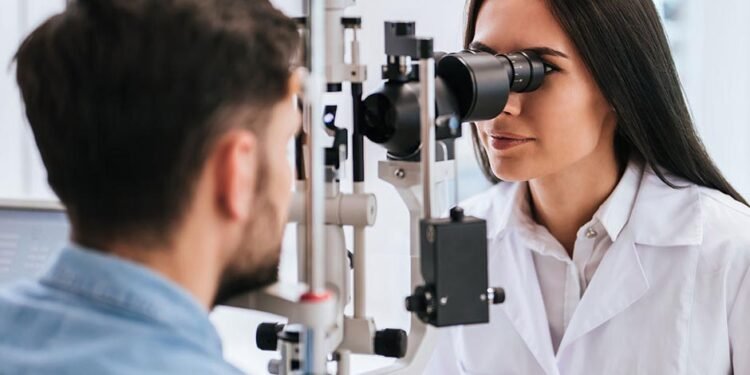When did you last check your eyes? You might be surprised, but millions of people deal with eye problems every day. Many forget how important it is to get regular eye exams. Issues like dry eyes and blurry vision can happen to anyone. The great news? Professional eye care can help solve these problems.
Let’s explore how routine check-ups can keep your vision clear and your eyes healthy! Don’t wait-make your eye health a priority today!
Refractive Errors
Refractive errors occur when the shape of the eye prevents light from focusing directly on the retina. Common issues include:
- Nearsightedness (myopia)
- Farsightedness (hyperopia)
- Astigmatism
Professional Help
Eye care professionals give thorough eye exams to check for refractive errors. They can help you see better with glasses, contact lenses, or surgery like LASIK.
Cataracts
Cataracts cause cloudy or blurry vision, making it hard to do everyday things like reading or driving. People with cataracts might also notice more glare, have trouble seeing at night, and see colors that look faded.
If cataracts are not treated, they can lead to serious vision problems. That’s why it is important to get them diagnosed and treated quickly.
Professional Help
A professional eye care provider can diagnose cataracts and recommend surgery. This surgery removes the cloudy lens. Then, a clear artificial lens is put in its place.
Glaucoma
Glaucoma involves high pressure in the eye. This can hurt the optic nerve and cause vision loss. Many people do not see signs of glaucoma until they have lost a lot of vision, so regular eye exams are very important.
Common problems include losing side vision, which can turn into tunnel vision. In some cases, acute glaucoma can cause severe eye pain, nausea, and headaches.
Professional Help
Regular eye exams can detect glaucoma early. Treatments may include prescription eye drops, oral medications, laser therapy, or surgery to lower eye pressure.
Age-Related Macular Degeneration (AMD)
AMD mainly affects the macula, which is the central part of the retina that helps you see clearly. Common problems include blurry or twisted central vision, making it hard to read, drive, or recognize faces.
In later stages, people may lose their central vision completely, but they can still see out of the sides. This can make everyday tasks difficult. It is important to catch AMD early and manage it to slow its progress and keep as much vision as possible.
Professional Help
Eye care professionals are important for managing Age-Related Macular Degeneration (AMD). They do regular eye exams to keep track of how the disease is changing.
They may use special imaging tools like optical coherence tomography (OCT) to look at the retina and find the best treatments. Treatments for AMD can include anti-VEGF injections to help protect vision, laser therapy to treat abnormal blood vessels, and advice on eating a healthy diet full of antioxidants for better eye health.
Diabetic Retinopathy
Diabetic retinopathy is a complication of diabetes that affects the blood vessels in the retina. This can lead to potential vision loss.
Common issues include blurred or fluctuating vision, dark spots, and difficulty seeing colors. These issues can worsen over time if not treated.
As the condition progresses, it can result in more severe symptoms. This includes floaters, flashes of light, and eventually, total vision loss if left unmanaged.
Professional Help
In diabetic retinopathy, getting professional help is important for spotting and treating the problem early. Eye care specialists do thorough eye exams, including checking the retina closely, to see how diabetes is affecting it.
Treatment can include laser therapy to fix leaking blood vessels, injections to reduce swelling, or surgery to remove blood from the eye. All of these are aimed at keeping your vision and eye health strong.
Dry Eye Syndrome
Insufficient tear production leading to irritation, redness, and discomfort. In comparing pink eye vs dry eye, it’s important to note that pink eye often presents with more noticeable redness and discharge. Meanwhile, dry eye typically causes a gritty sensation and sensitivity to light.
Professional Help
For dry eye syndrome, eye care professionals check how bad the condition is by doing a complete eye exam and special tests to see how much you tear. Based on what they find, they may suggest treatments like prescription artificial tears, anti-inflammatory medicine, or simple changes like adding moisture to your home. In some cases, they might use punctal plugs to stop tears from draining away, which helps keep your eyes moist longer.
Conjunctivitis (Pink Eye)
Conjunctivitis can be caused by various factors. This includes viral or bacterial infections, allergens, and irritants.
Viral conjunctivitis often presents with watery discharge. It is also highly contagious.
Meanwhile, bacterial conjunctivitis causes a thicker, yellow or green discharge. It may require antibiotic treatment.
Allergic conjunctivitis is characterized by redness, itching, and swelling. It is often triggered by allergens like pollen or pet dander.
Professional Help
A professional eye care provider can accurately diagnose conjunctivitis by examining the eye and reviewing symptoms. Depending on the cause they will recommend appropriate treatments.
This includes antibiotic eye drops for bacterial infections or antihistamines for allergies. Additionally, they may provide advice on proper hygiene practices to prevent the spread of infection and manage symptoms effectively
Retinal Detachment
Retinal detachment occurs when the retina separates from its underlying tissue. This can lead to serious vision loss if not treated quickly.
Common symptoms include sudden flashes of light, floaters, and a shadow or curtain over part of the visual field. Risk factors for retinal detachment include aging, previous eye surgeries, and certain eye conditions like myopia. Thus, making it crucial to seek immediate medical attention if symptoms arise.
Professional Help
If you have a retinal detachment, it’s very important to get medical help right away. Quick treatment can stop permanent vision loss. An eye care professional will check your eyes to confirm the problem and see how serious it is.
Possible treatments include laser surgery to fix the retina, cryotherapy to freeze the area, or vitrectomy to remove the gel causing the pull. These treatments help reattach the retina and can restore your vision.
Prioritize Your Eye Health with Professional Eye Care Services
Understanding and addressing common eye issues through professional eye care is crucial for maintaining good vision and overall health. Regular check-ups, personalized treatment plans, and education empower you to take control of your eye health. Don’t wait until discomfort arises; make an appointment with a professional eye care provider today. Your eyes will thank you!
Is this article helpful? Keep reading our blog for more.












